八年级英语下册语法部分
- 格式:pdf
- 大小:324.60 KB
- 文档页数:8
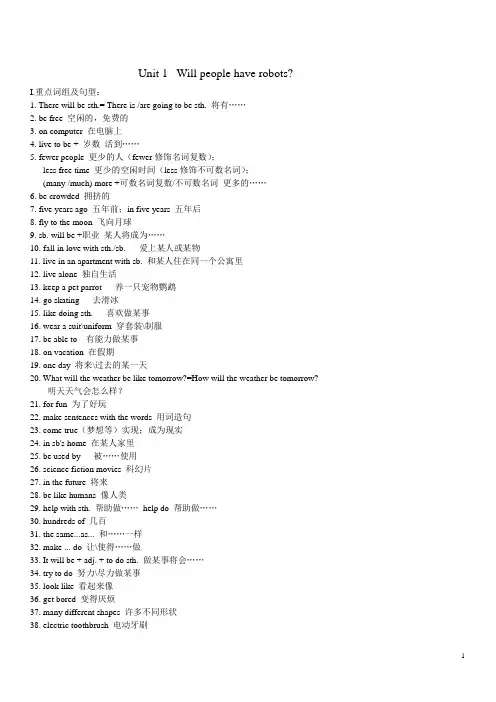
Unit 1 Will people have robots?I.重点词组及句型:1. There will be sth.= There is /are going to be sth. 将有……2. be free 空闲的,免费的3. on computer 在电脑上4. live to be + 岁数活到……5. fewer people 更少的人(fewer修饰名词复数);less free time 更少的空闲时间(less修饰不可数名词);(many /much) more +可数名词复数/不可数名词更多的……6. be crowded 拥挤的7. five years ago 五年前;in five years 五年后8. fly to the moon 飞向月球9. sb. will be +职业某人将成为……10. fall in love with sth./sb.爱上某人或某物11. live in an apartment with sb. 和某人住在同一个公寓里12. live alone 独自生活13. keep a pet parrot 养一只宠物鹦鹉14. go skating去滑冰15. like doing sth.喜欢做某事16. wear a suit\uniform 穿套装\制服17. be able to有能力做某事18. on vacation 在假期19. one day 将来\过去的某一天20. What will the weather be like tomorrow?=How will the weather be tomorrow?明天天气会怎么样?21. for fun 为了好玩22. make sentences with the words 用词造句23. come true(梦想等)实现;成为现实24. in sb's home 在某人家里25. be used by被……使用26. science fiction movies 科幻片27. in the future 将来28. be like humans 像人类29. help with sth. 帮助做……help do 帮助做……30. hundreds of 几百31. the same...as... 和……一样32. make ... do 让\使得……做33. It will be + adj. + to do sth. 做某事将会……34. try to do 努力\尽力做某事35. look like 看起来像36. get bored 变得厌烦37. many different shapes 许多不同形状38. electric toothbrush 电动牙刷1II.重点句型:1. People will have robots in their homes. 在家庭中人们会有机器人的。
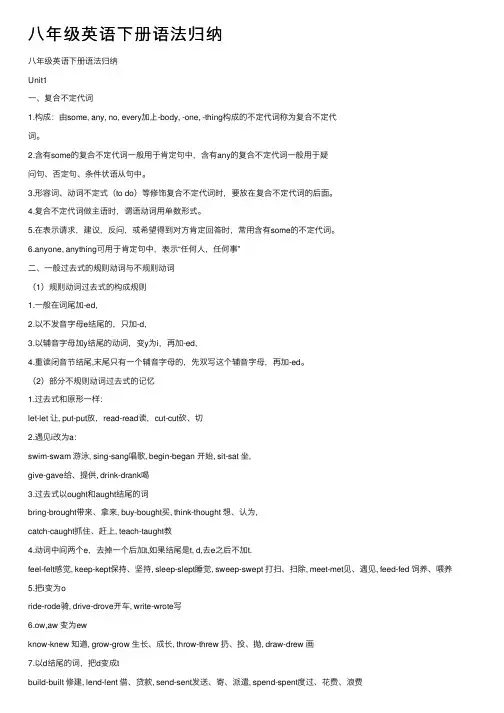
⼋年级英语下册语法归纳⼋年级英语下册语法归纳Unit1⼀、复合不定代词1.构成:由some, any, no, every加上-body, -one, -thing构成的不定代词称为复合不定代词。
2.含有some的复合不定代词⼀般⽤于肯定句中,含有any的复合不定代词⼀般⽤于疑问句、否定句、条件状语从句中。
3.形容词、动词不定式(to do)等修饰复合不定代词时,要放在复合不定代词的后⾯。
4.复合不定代词做主语时,谓语动词⽤单数形式。
5.在表⽰请求,建议,反问,或希望得到对⽅肯定回答时,常⽤含有some的不定代词。
6.anyone, anything可⽤于肯定句中,表⽰“任何⼈,任何事”⼆、⼀般过去式的规则动词与不规则动词(1)规则动词过去式的构成规则1.⼀般在词尾加-ed,2.以不发⾳字母e结尾的,只加-d,3.以辅⾳字母加y结尾的动词,变y为i,再加-ed,4.重读闭⾳节结尾,末尾只有⼀个辅⾳字母的,先双写这个辅⾳字母,再加-ed。
(2)部分不规则动词过去式的记忆1.过去式和原形⼀样:let-let 让, put-put放,read-read读,cut-cut砍、切2.遇见i改为a:swim-swam 游泳, sing-sang唱歌, begin-began 开始, sit-sat 坐,give-gave给、提供, drink-drank喝3.过去式以ought和aught结尾的词bring-brought带来、拿来, buy-bought买, think-thought 想、认为,catch-caught抓住、赶上, teach-taught教4.动词中间两个e,去掉⼀个后加t,如果结尾是t, d,去e之后不加t.feel-felt感觉, keep-kept保持、坚持, sleep-slept睡觉, sweep-swept 打扫、扫除, meet-met见、遇见, feed-fed 饲养、喂养5.把i变为oride-rode骑, drive-drove开车, write-wrote写6.ow,aw 变为ewknow-knew 知道, grow-grow ⽣长、成长, throw-threw 扔、投、抛, draw-drew 画7.以d结尾的词,把d变成tbuild-built 修建, lend-lent 借、贷款, send-sent发送、寄、派遣, spend-spent度过、花费、浪费Unit2频度副词1.表⽰次数、频率的副词称为频度副词。
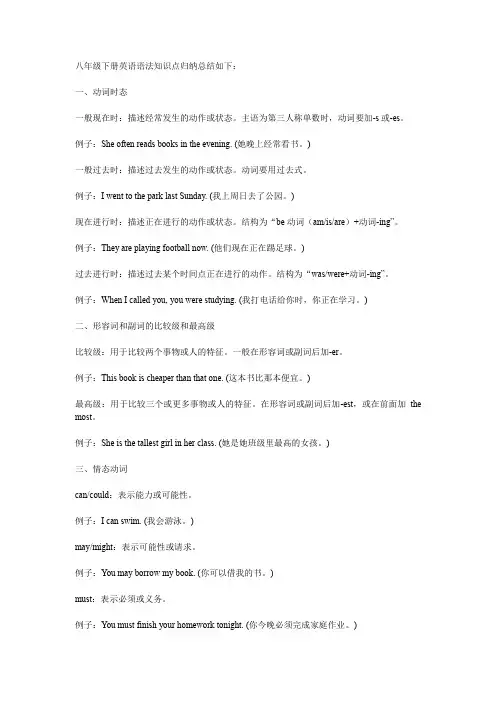
八年级下册英语语法知识点归纳总结如下:一、动词时态一般现在时:描述经常发生的动作或状态。
主语为第三人称单数时,动词要加-s或-es。
例子:She often reads books in the evening. (她晚上经常看书。
)一般过去时:描述过去发生的动作或状态。
动词要用过去式。
例子:I went to the park last Sunday. (我上周日去了公园。
)现在进行时:描述正在进行的动作或状态。
结构为“be动词(am/is/are)+动词-ing”。
例子:They are playing football now. (他们现在正在踢足球。
)过去进行时:描述过去某个时间点正在进行的动作。
结构为“was/were+动词-ing”。
例子:When I called you, you were studying. (我打电话给你时,你正在学习。
)二、形容词和副词的比较级和最高级比较级:用于比较两个事物或人的特征。
一般在形容词或副词后加-er。
例子:This book is cheaper than that one. (这本书比那本便宜。
)最高级:用于比较三个或更多事物或人的特征。
在形容词或副词后加-est,或在前面加the most。
例子:She is the tallest girl in her class. (她是她班级里最高的女孩。
)三、情态动词can/could:表示能力或可能性。
例子:I can swim. (我会游泳。
)may/might:表示可能性或请求。
例子:You may borrow my book. (你可以借我的书。
)must:表示必须或义务。
例子:You must finish your homework tonight. (你今晚必须完成家庭作业。
)四、被动语态被动语态用于描述事物的状态或描述被动发生的动作。
结构为“be动词(am/is/are/was/were)+动词的过去分词”。
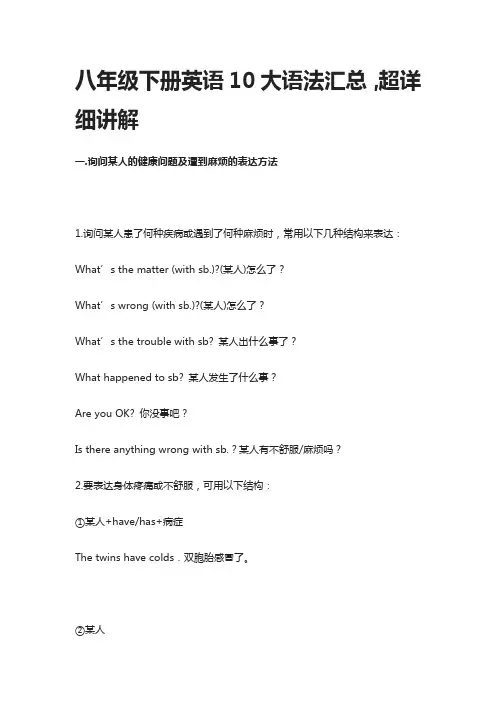
八年级下册英语10大语法汇总,超详细讲解一.询问某人的健康问题及遭到麻烦的表达方法1.询问某人患了何种疾病或遇到了何种麻烦时,常用以下几种结构来表达:What’s the matter (with sb.)?(某人)怎么了?What’s wrong (with sb.)?(某人)怎么了?What’s the trouble with sb? 某人出什么事了?What happened to sb? 某人发生了什么事?Are you OK? 你没事吧?Is there anything wrong with sb.?某人有不舒服/麻烦吗?2.要表达身体疼痛或不舒服,可用以下结构:①某人+have/has+病症The twins have colds.双胞胎感冒了。
②某人+have/has+a+headache/toothache/stomachache/backache/earache. She had a stomachache last night.她昨晚肚子痛。
③某人+have/has+a+sore+发病部位He has a sore throat.他喉咙痛。
④某人+hurt(s)+身体部位或反身代词He hurt his leg.他的腿受伤了。
⑤某部位+hurt(s).My head hurts badly.我头痛得厉害。
⑥某人+have/has+a pain+in one’s+身体部位I have a pain in my chest.我胸口痛。
⑦(There is) something wrong with one’s+身体部位There is something wrong with my right eye.我的右眼有毛病。
⑧其他表达方式She has a heart trouble.她有心脏病。
He got hit on the head.他头部受到了撞击。
She cut her finger.她割破手指了。
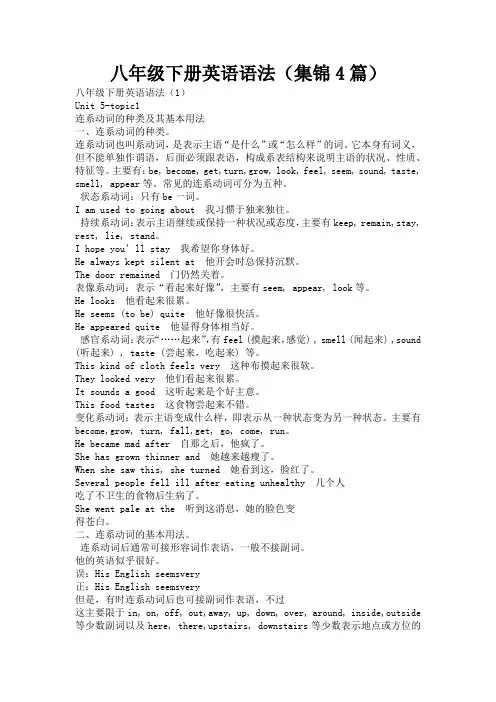
八年级下册英语语法(集锦4篇)八年级下册英语语法(1)Unit 5-topic1连系动词的种类及其基本用法一、连系动词的种类。
连系动词也叫系动词,是表示主语“是什么”或“怎么样”的词。
它本身有词义,但不能单独作谓语,后面必须跟表语,构成系表结构来说明主语的状况、性质、特征等。
主要有:be, become, get,turn,grow, look, feel, seem, sound, taste, smell, appear等。
常见的连系动词可分为五种。
状态系动词:只有be一词。
I am used to going about 我习惯于独来独往。
持续系动词:表示主语继续或保持一种状况或态度,主要有keep, remain,stay, rest, lie, stand。
I hope you’ll stay 我希望你身体好。
He always kept silent at 他开会时总保持沉默。
The door remained 门仍然关着。
表像系动词:表示“看起来好像”,主要有seem, appear, look等。
He looks 他看起来很累。
He seems (to be) quite 他好像很快活。
He appeared quite 他显得身体相当好。
感官系动词:表示“……起来”,有feel (摸起来,感觉) , smell (闻起来) ,sound (听起来) , taste (尝起来,吃起来) 等。
This kind of cloth feels very 这种布摸起来很软。
They looked very 他们看起来很累。
It sounds a good 这听起来是个好主意。
This food tastes 这食物尝起来不错。
变化系动词:表示主语变成什么样,即表示从一种状态变为另一种状态。
主要有become,grow, turn, fall,get, go, come, run。
He became mad after 自那之后,他疯了。
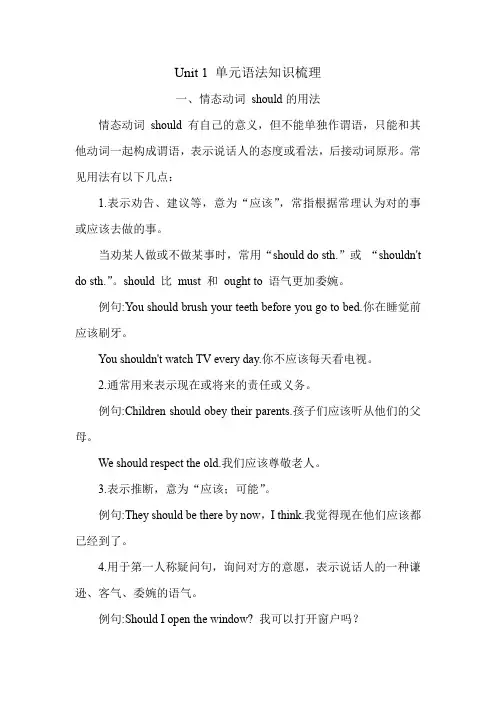
Unit 1 单元语法知识梳理一、情态动词should的用法情态动词should有自己的意义,但不能单独作谓语,只能和其他动词一起构成谓语,表示说话人的态度或看法,后接动词原形。
常见用法有以下几点:1.表示劝告、建议等,意为“应该”,常指根据常理认为对的事或应该去做的事。
当劝某人做或不做某事时,常用“should do sth.”或“shouldn't do sth.”。
should 比must 和ought to 语气更加委婉。
例句:You should brush your teeth before you go to bed.你在睡觉前应该刷牙。
You shouldn't watch TV every day.你不应该每天看电视。
2.通常用来表示现在或将来的责任或义务。
例句:Children should obey their parents.孩子们应该听从他们的父母。
We should respect the old.我们应该尊敬老人。
3.表示推断,意为“应该;可能”。
例句:They should be there by now,I think.我觉得现在他们应该都已经到了。
4.用于第一人称疑问句,询问对方的意愿,表示说话人的一种谦逊、客气、委婉的语气。
例句:Should I open the window? 我可以打开窗户吗?What should we do now? 我们现在该干什么呢?5.表示某种感情色彩,意为“竟会”,常用于以how, why开头引导的特殊疑问句中。
例句:Why should you be so early today? 你今天为什么会如此早?二、反身代词1.反身代词的构成反身代词是一种表示反射或强调的代词。
它由第一人称、第二人称的形容词性物主代词和第三人称代词的宾格加词尾-self或-selves构成。
其构成如下表:反身代词与它所指代的名词或代词形成互指关系,两者在人称和数上应保持一致。
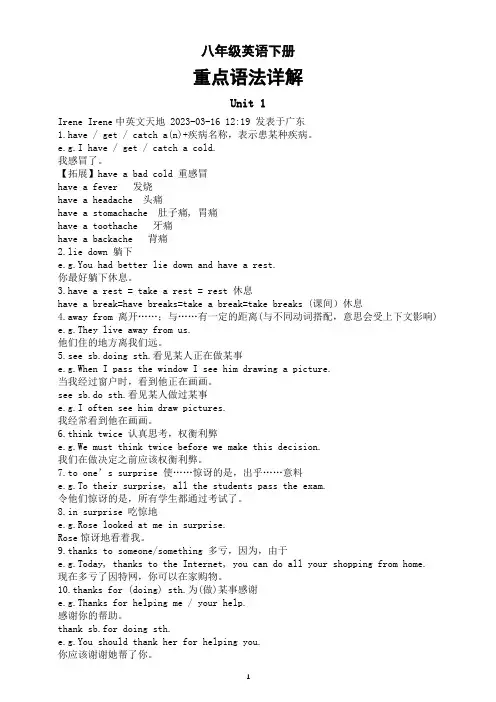
八年级英语下册重点语法详解Unit 1Irene Irene中英文天地 2023-03-16 12:19 发表于广东1.have / get / catch a(n)+疾病名称,表示患某种疾病。
e.g.I have / get / catch a cold.我感冒了。
【拓展】have a bad cold 重感冒have a fever 发烧have a headache 头痛have a stomachache 肚子痛, 胃痛have a toothache 牙痛have a backache 背痛2.lie down 躺下e.g.You had better lie down and have a rest.你最好躺下休息。
3.have a rest = take a rest = rest 休息have a break=have breaks=take a break=take breaks (课间)休息4.away from 离开……;与……有一定的距离(与不同动词搭配,意思会受上下文影响)e.g.They live away from us.他们住的地方离我们远。
5.see sb.doing sth.看见某人正在做某事e.g.When I pass the window I see him drawing a picture.当我经过窗户时,看到他正在画画。
see sb.do sth.看见某人做过某事e.g.I often see him draw pictures.我经常看到他在画画。
6.think twice 认真思考,权衡利弊e.g.We must think twice before we make this decision.我们在做决定之前应该权衡利弊。
7.to one’s surprise 使……惊讶的是,出乎……意料e.g.To their surprise, all the students pass the exam.令他们惊讶的是,所有学生都通过考试了。
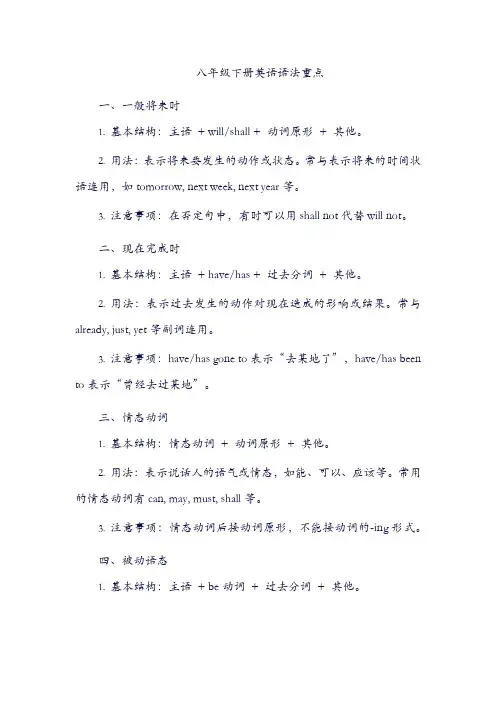
八年级下册英语语法重点一、一般将来时1.基本结构:主语+ will/shall + 动词原形+ 其他。
2.用法:表示将来要发生的动作或状态。
常与表示将来的时间状语连用,如tomorrow, next week, next year等。
3.注意事项:在否定句中,有时可以用shall not代替will not。
二、现在完成时1.基本结构:主语+ have/has + 过去分词+ 其他。
2.用法:表示过去发生的动作对现在造成的影响或结果。
常与already, just, yet等副词连用。
3.注意事项:have/has gone to表示“去某地了”,have/has been to表示“曾经去过某地”。
三、情态动词1.基本结构:情态动词+ 动词原形+ 其他。
2.用法:表示说话人的语气或情态,如能、可以、应该等。
常用的情态动词有can, may, must, shall等。
3.注意事项:情态动词后接动词原形,不能接动词的-ing形式。
四、被动语态1.基本结构:主语+ be动词+ 过去分词+ 其他。
2.用法:表示主语是动作的接受者。
常与by引导的方式状语连用,如by machine, by air等。
3.注意事项:被动语态的时态变化主要通过be动词的变化来实现,不同时态的被动语态需要注意与该时态的主动语态相对应。
五、不定代词和冠词用法1.不定代词:表示泛指或不确定的代词,如some, any, other等。
some用于肯定句,any用于否定句或疑问句;other表示“其他的”。
2.冠词:表示特指或泛指的词,分为定冠词the和不定冠词a/an。
a用于辅音音素开头的单词前,an用于元音音素开头的单词前;the 表示特指或上文提到的某个名词。
3.用法:不定代词和冠词一起使用时,可以构成限定词短语,如some books, the school gate等。
限定词短语可以修饰名词,表示特指或泛指的概念。
4.注意事项:在英语中,不定代词和冠词的使用是有规则和限制的,需要根据上下文和语境来判断使用哪个代词或冠词。
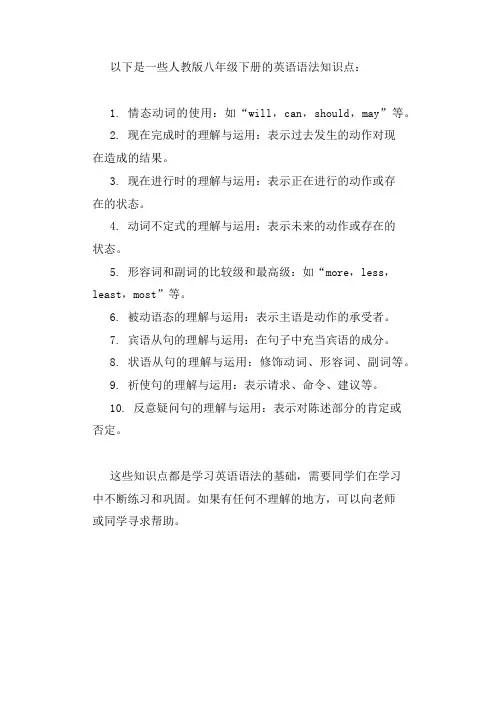
以下是一些人教版八年级下册的英语语法知识点:
1. 情态动词的使用:如“will,can,should,may”等。
2. 现在完成时的理解与运用:表示过去发生的动作对现
在造成的结果。
3. 现在进行时的理解与运用:表示正在进行的动作或存
在的状态。
4. 动词不定式的理解与运用:表示未来的动作或存在的
状态。
5. 形容词和副词的比较级和最高级:如“more,less,least,most”等。
6. 被动语态的理解与运用:表示主语是动作的承受者。
7. 宾语从句的理解与运用:在句子中充当宾语的成分。
8. 状语从句的理解与运用:修饰动词、形容词、副词等。
9. 祈使句的理解与运用:表示请求、命令、建议等。
10. 反意疑问句的理解与运用:表示对陈述部分的肯定或
否定。
这些知识点都是学习英语语法的基础,需要同学们在学习
中不断练习和巩固。
如果有任何不理解的地方,可以向老师
或同学寻求帮助。
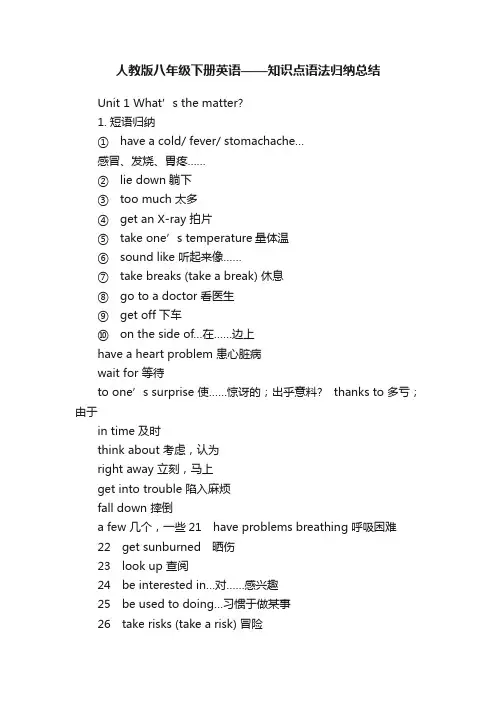
人教版八年级下册英语——知识点语法归纳总结Unit 1 What’s the matter?1. 短语归纳①have a cold/ fever/ stomachache…感冒、发烧、胃疼……②lie down 躺下③too much 太多④get an X-ray 拍片⑤take one’s temperature量体温⑥sound like 听起来像……⑦take breaks (take a break) 休息⑧go to a doctor 看医生⑨get off 下车⑩on the side of…在……边上have a heart problem 患心脏病wait for 等待to one’s surprise 使……惊讶的;出乎意料? thanks to 多亏;由于in time 及时think about 考虑,认为right away 立刻,马上get into trouble 陷入麻烦fall down 摔倒a few 几个,一些21 have problems breathing 呼吸困难22 get sunburned 晒伤23 look up 查阅24 be interested in…对……感兴趣25 be used to doing…习惯于做某事26 take risks (take a risk) 冒险27 lose one’s life 丧生28 became of 因为29 run out (of) 用尽,耗尽30 be ready to do sth. 准备做某事31 cut off 切除32 climb down 爬下33 get out of 离开;从……出来34 tell of 讲述35 the importance of (doing sth.) (做某事的)重要性36 be in control of 掌管,管理37 make a decision 做决定38 keep on doing sth. 坚持做某事39 give up 放弃40 cut/ hurt oneself 使自己受伤2. 典句必背①What’s the matter?②I have a stomachache.③What should I do?④Should I take my temperature?⑤I think you should lie down and rest.⑥If your head and neck still hurt tomorrow, then go to a doctor.⑦His love for mountain climbing is so great that he kept on climbing mountains even after this experience.3. 用法集萃(1) 当别人心情不好,身体不适或遇到麻烦时,我们可以用如下表达表示关心:What’s the matter?What’s the matter with you?What’s wrong with …?What’s the trouble\problem with …?(2) 英语中常用have描述身体的不适,此时have意为“患有”,常用结构:①have a + 疾病例:have a cold 感冒;have a fever 发烧;have a cough 咳嗽②have a + 身体部位-ache例:have a headache 头痛;have a toothache 牙痛③have a sore + 身体部位例:have a sore throat 咽喉痛;have a sore back 背痛(3) lie down躺下;tell lies/a lie 说谎含义过去式过去分词躺;平躺lay lain位于撒谎;说谎lied lied(4) maybe & may be①maybe,“或许”,常用于句首,表示可能性,后加句子。
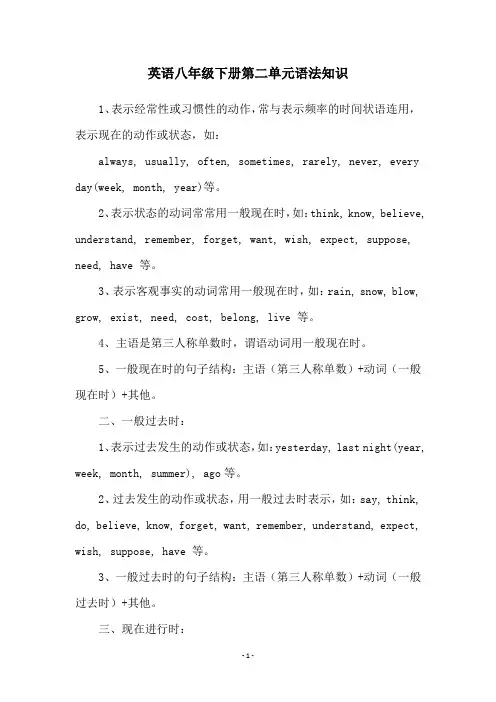
英语八年级下册第二单元语法知识1、表示经常性或习惯性的动作,常与表示频率的时间状语连用,表示现在的动作或状态,如:always, usually, often, sometimes, rarely, never, every day(week, month, year)等。
2、表示状态的动词常常用一般现在时,如:think, know, believe, understand, remember, forget, want, wish, expect, suppose, need, have 等。
3、表示客观事实的动词常用一般现在时,如:rain, snow, blow, grow, exist, need, cost, belong, live 等。
4、主语是第三人称单数时,谓语动词用一般现在时。
5、一般现在时的句子结构:主语(第三人称单数)+动词(一般现在时)+其他。
二、一般过去时:1、表示过去发生的动作或状态,如:yesterday, last night(year, week, month, summer), ago等。
2、过去发生的动作或状态,用一般过去时表示,如:say, think, do, believe, know, forget, want, remember, understand, expect, wish, suppose, have 等。
3、一般过去时的句子结构:主语(第三人称单数)+动词(一般过去时)+其他。
三、现在进行时:1、表示当前正在进行或发生的动作,如:now, at present, at the moment, still, look 等。
2、表示经常性的动作或一段持续的动作时,常用现在进行时,如:work, play, read, run, swim, stay 等。
3、现在进行时的句子结构:主语(第三人称单数)+ be 动词(am, is, are)+ 动词(现在分词)+ 其他。
Unit 1第一部分:Grammar一、情态动词(Modal Verbs)情态动词should 意为“应该,应当”,必须和后面的动词原形一起构成谓语,没有人称和数的变化。
用以表达职责和义务、提出劝告,而且表述的是自己的主观看法。
注意:should 在以why,who,how 等疑问词开头的问句中,意为“竟然,居然,怎么会”,表示意外、惊喜或在说话人看来是不可思议的。
三、反身代词表示反射或强调的代词叫做反身代词。
反身代词是由第一人称、第二人称形容词性物主代词或第三人称代词的宾格形式,词尾加self 或selves 组成。
反身代词可译“本人”、“本身”,为加强语气,也常翻译为“亲自”、“自己”。
不定人称代词one ---- o neself.第二部分:单词用法Section A1.What’s the matter?怎么了?该句常用询问某人患了何种疾病或遇到了什么麻烦,其后用with 引出对象。
1). What’s the matter with sb.?=what’s wrong with sb.?=what’s the trouble/problem with sb.?=what’s one’s trouble/problem?e.g. What’s the matter w ith Tom?=what’s with Tom?=What’s the with Tom?=What’s Tom’s?2). matter, 名词,“问题,事情”e.g. We have important (matter) to discuss.我们有些重要的问题要讨论。
3). 动词,“要紧,关系重大”e.g. It dosen’t that you came late.2.I have a cold. 我感冒了。
1).have/get/catch a cold “感冒,着凉”The old man a cold yesterday.那位老人昨天感冒了。
八年级下册英语复合句语法知识点归纳总结复合句是由两个或更多的句子组成的句子。
下面是八年级下册英语复合句的一些常见语法知识点总结:1. 关系代词关系代词用来引导定语从句,常见的关系代词有:who, whom, whose, which, that。
关系代词在从句中作为主语、宾语、或定语。
例句:- The girl who is wearing a red dress is my sister.- This is the book that I borrowed from the library.2. 定语从句定语从句用来修饰名词或代词,给出更多的信息。
定语从句通常用关系代词引导。
例句:- The house where he was born is now a museum.3. 时间状语从句时间状语从句用来表示时间,通常由when, while, before, after, since, until等引导。
例句:- I will visit my grandparents when I have time.4. 原因状语从句原因状语从句用来表示原因,通常由because, since, as等引导。
例句:5. 结果状语从句结果状语从句用来表示结果,通常由so, such...that, so that等引导。
例句:- The weather was so cold that we couldn't go outside.6. 目的状语从句目的状语从句用来表示目的,通常由in order to, so as to等引导。
例句:- I study hard in order to pass the exam.7. 条件状语从句条件状语从句用来表示条件,通常由if, unless, as long as, provided that等引导。
例句:- If it rains, we will stay indoors.以上是八年级下册英语复合句的一些常见语法知识点。
八年级下英语基本句型及语法1.Kids will study at home on computers.表通过电脑、电视及广播等用介词on2.In ten years, I think I will be a reporter.In , after和later的区别in +时间段:与将来时连用He will be back in two hours.after +时间段:与过去时连用He came back after two hours.after +时间点:可与将来时连用He will be back after two o\'clock.later只能接在时间段之后,即可用于过去时也可用于将来时。
Some days later, he become well again.I will go back two days later.3. On the weekend, I will be able to dress more cusually.can , be able to.1)can表示“能力”时,和be able to相当,许多场合都可以互相替换。
但当叙述过去经过一番努力才能完成的事情或前面有特殊说明,表示你有能力时,只能用be able to。
Can you speak any foreign languages?=Are you able to speak any foreign languages?2).can 只能用于一般现在时和一般过去时,而be able to可用于各种时态。
No one could / was able to answer this question.When he grows up, he will be able to support his family.他长大后就能养家了。
Frank is ill. He hasn't been able to go to school for one week. 弗兰克病了,已经一周没去上学了。
模块一语法表示感觉和知觉的系动词1.表示感觉和知觉的系动词也可称为感官动词,主要有look (看起来), smell (闻起来), sound (听起来), taste (尝起来), feel (感觉/摸起来)。
2.感官动词属于连系动词,后接形容词作表语,构成系表结构,说明主语所处的状态。
例如:He looks tired. 他看起来累了。
These flowers smell sweet. 这些花闻起来香Her voice sounds beautiful. 她的声音听起来优美。
The cake tastes delicious .蛋糕尝起来美味。
I felt guilty. 我感到内疚。
3.感官动词后可接介词like, like后可接名词或v.ing形式。
例如:That boat looks like a duck.那条船看起来像一只鸭子。
It smells like being burnt.它闻起来像烧焦了一样4.含有感官动词的句子,其否定句和一般疑问句要借助助动词完成。
例如:He looks worried. 他看起来忧愁。
→He doesn't look worried他看起来并不忧愁。
→Does he look worried?他看起来忧愁吗?Ⅰ. 单项选择( )1. The cake ________ delicious. I can't wait to eat it. A.feels B.sounds C.becomes D.smells( )2.Apples of this kind ________.A.tastes good B.tastes well C.taste good D.taste well( )3.[2015•潍坊]The new sweater I bought for my grandma ________ soft. She likes it very much. A.looks B.smells C.tastes D.feels( )4. —Oh, I'm hungry. Mum, can I have the hamburger on the plate? —No. It tastes________.A. terriblyB. terribleC. goodD. well( )5.—The cake looks ________. —Yes, and it tastes even ________.A. well; goodB. nice; betterC. good; worseD. better; best( )6.[2015•镇江]—ThreeD printing technology could be used to build a house in less than 24 hours.—It ________ amazing. It's my first time to get to know the news A.looks B.smells C.sounds D.tastes( )7.Oh, it________so nice. What beautiful music it is! A.smells B.sounds C.tastes D.looks ( )8.—Dinner is ready. Help yourself! —Wow! It ________ delicious. You are really good at cooking. A.looks B.sounds C.tastes D.feels( )9.—Let's go on a picnic this weekend, OK? —That sounds________.A.great B.well C.hardly D.terribly( )10.I like to read English in the garden because the flowers in it smell ________.A.good B.well C.bad D.badly( )11.—Do you like swimming in winter?—Of course. The water ________ a bit cold at first, but then I am warm and full of energy.A.tastes B.feels C.smells D.looks( )12.Mum is making dinner. It ________ so nice! A.smells B.tastes C.feels D.sounds ( )13.Good medicine for health ________ bitter to the mouth. A.feel B.tastes C.feels D.taste ( )14.Some of my friends eat with their eyes. They prefer to order what ________ nice.A.feels B.smeels C.looks D.tastes( )15.—Do you know the song Gangnam Style?—Of course. It ________ interesting.A.t astes B.smells C.sounds D.feelsⅡ.根据汉语意思完成句子1.我的毛衣摸起来柔软。
八年级英语下册语法知识生命是短暂的,空余时间很少,因此我们不应把一刻空余时间耗费在阅读价值不大的书籍上。
下面给大家带来一些关于八年级英语下册语法知识,希望对大家有所帮助。
八年级英语下册语法1一般将来时态的应用do/does 的一般将来时态形式:(shall/will) dodo/does 的一般将来时态的被动语态:(shall/will) be done一般将来时态的肯定句、否定句、疑问句形式:肯定句例句:People will have robots in a few years.否定句例句:People (will not/won't) have robots in a few years.一般疑问句例句:Will people have robots in a few years?特殊疑问句例句:What will people have in a few years?八年级英语下册语法2过去将来时一、过去将来时的结构should/would+动词原形do/does 的过去将来时态形式:(should/would) dodo/does的过去将来时态的被动语态:(should/would) be done 过去将来时态的肯定句、否定句、疑问句形式:肯定句例句:You should write a letter to him.否定句例句:You shouldn't write a letter to him.一般疑问句例句:Should I write a letter to him?特殊疑问句例句:What should I do?八年级英语下册语法3过去进行时do/does 的过去进行时态形式:(was/were) doingdo/does 的过去进行时态的被动语态:(was/were) being done过去将来时态的肯定句、否定句和疑问句形式:肯定句例句:I was walking down the street when a UFO landed.否定句例句:I wasn't walking down the street when a UFO landed.一般疑问句例句:Were you walking down the street when a UFO landed?特殊疑问句例句:What were you doing when a UFO landed?动词 when 和 while 的选择:when 后加瞬间动词,while 后加延续性动词。